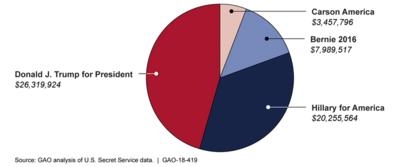Reviewed 40 Overnight Trips, Found That Campaigns Were Overpaid Nearly $4 Million
The Secret Service incurs millions of dollars in travel expenses to provide security during the fast-paced operational tempo of a presidential campaign. In connection with the 2016 presidential campaign, the Secret Service provided protection for four presidential candidates, two vice presidential candidates, and six of the candidates' family members.

GAO was asked to review the Secret Service's travel-related expenses for the 2016 presidential campaign. This report examines (1) how much the Secret Service incurred in travel-related expenses, and (2) the extent to which travel-related payments and reimbursements were made in accordance with laws, regulations, and policies. GAO analyzed Secret Service data to determine the travel expenses incurred by the agency for the 2016 presidential campaign. GAO also randomly selected 40 overnight trips to assess the Secret Service's compliance with provisions of its lodging policies and the Federal Travel Regulation. GAO analyzed the Secret Service's payments to campaign committees to determine whether committees were reimbursed the correct amounts for charter flights.
For the 40 overnight trips GAO reviewed, the Secret Service generally followed its policies and regulations for lodging payments. However, GAO found that the agency overpaid the campaign committees at least an estimated $3.9 million when reimbursing them for special agents' seats on charter flights. Since at least 1977, the Secret Service's policy has been to pay the lower of two fares when reimbursing campaign committees for special agents' travel on chartered aircraft flights. Specifically, the Secret Service is to pay the lower of the following two fares: the lowest commercially available first-class airfare, or the pro rata fare—the cost of the agent's seat on the charter flight calculated by taking the total cost of the charter divided by the number of passengers on board. However, during the 2016 presidential campaign, Secret Service officials misinterpreted a Federal Election Commission regulation, and as a result, did not conduct the comparison. Instead, the Secret Service solely paid
the pro rata fare to the campaign committees. Eight months before the end of the 2016 presidential campaign, Secret Service officials determined the interpretation was erroneous, but did not ensure the agency reverted to its long standing policy. During these 8 months, 66 percent of all campaign-related flights with special agents on board were taken.
Federal agencies are generally required to collect on debts that have been determined by an appropriate official of the federal government to be owed to the United States. Debts include overpayments. Pursuing debt collection, however, will require the Secret Service to calculate the specific amount it overpaid to the campaign committees and determine how to proceed with seeking repayment from the various committees, as appropriate.
GAO is making five recommendations, including that the Secret Service should (1) calculate its overpayments to the campaign committees for special agents' seats on chartered aircraft flights, and (2) determine how it should proceed with respect to collecting on identified debts. The Department of Homeland Security concurred with the recommendations and identified actions underway to address them.
(Source: GAO Report Executive Summary. Graphic provided)
 NTSB Final Report: Rutan Long-EZ
NTSB Final Report: Rutan Long-EZ ANN FAQ: Turn On Post Notifications
ANN FAQ: Turn On Post Notifications Classic Aero-TV: ICAS Perspectives - Advice for New Air Show Performers
Classic Aero-TV: ICAS Perspectives - Advice for New Air Show Performers ANN's Daily Aero-Linx (06.28.25)
ANN's Daily Aero-Linx (06.28.25) Aero-News: Quote of the Day (06.28.25)
Aero-News: Quote of the Day (06.28.25)



